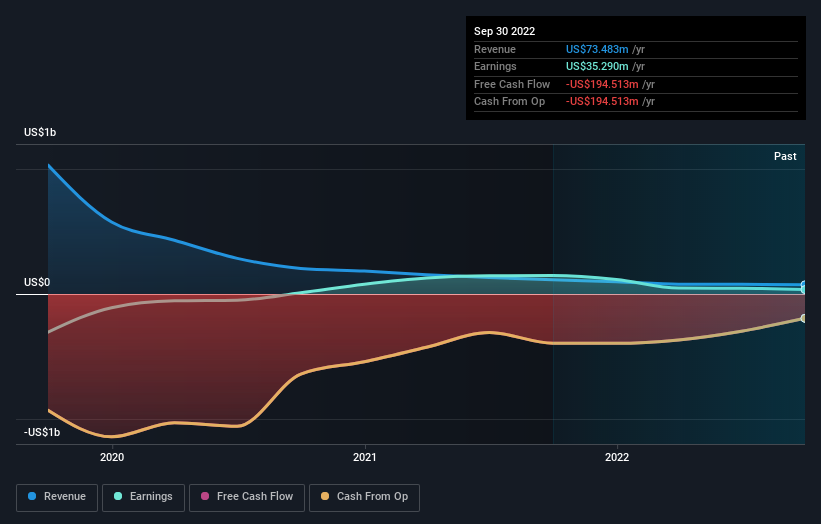Individual investors account for 42% of Maiden Holdings, Ltd.'s (NASDAQ:MHLD) ownership, while institutions account for 25%
To get a sense of who is truly in control of Maiden Holdings, Ltd. (NASDAQ:MHLD), it is important to understand the ownership structure of the business. And the group that holds the biggest piece of the pie are individual investors with 42% ownership. In other words, the group stands to gain the most (or lose the most) from their investment into the company.
And institutions on the other hand have a 25% ownership in the company. Institutions will often hold stock in bigger companies, and we expect to see insiders owning a noticeable percentage of the smaller ones.
Let's delve deeper into each type of owner of Maiden Holdings, beginning with the chart below.
Check out our latest analysis for Maiden Holdings
What Does The Institutional Ownership Tell Us About Maiden Holdings?
Many institutions measure their performance against an index that approximates the local market. So they usually pay more attention to companies that are included in major indices.
Maiden Holdings already has institutions on the share registry. Indeed, they own a respectable stake in the company. This can indicate that the company has a certain degree of credibility in the investment community. However, it is best to be wary of relying on the supposed validation that comes with institutional investors. They too, get it wrong sometimes. When multiple institutions own a stock, there's always a risk that they are in a 'crowded trade'. When such a trade goes wrong, multiple parties may compete to sell stock fast. This risk is higher in a company without a history of growth. You can see Maiden Holdings' historic earnings and revenue below, but keep in mind there's always more to the story.
It looks like hedge funds own 10% of Maiden Holdings shares. That worth noting, since hedge funds are often quite active investors, who may try to influence management. Many want to see value creation (and a higher share price) in the short term or medium term. Our data shows that Phillips Ray Capital Management is the largest shareholder with 9.0% of shares outstanding. For context, the second largest shareholder holds about 8.4% of the shares outstanding, followed by an ownership of 7.3% by the third-largest shareholder. Barry Zyskind, who is the third-largest shareholder, also happens to hold the title of Chairman of the Board. In addition, we found that Patrick Haveron, the CEO has 2.4% of the shares allocated to their name.
A closer look at our ownership figures suggests that the top 12 shareholders have a combined ownership of 51% implying that no single shareholder has a majority.
Researching institutional ownership is a good way to gauge and filter a stock's expected performance. The same can be achieved by studying analyst sentiments. We're not picking up on any analyst coverage of the stock at the moment, so the company is unlikely to be widely held.
Insider Ownership Of Maiden Holdings
The definition of company insiders can be subjective and does vary between jurisdictions. Our data reflects individual insiders, capturing board members at the very least. Company management run the business, but the CEO will answer to the board, even if he or she is a member of it.
Insider ownership is positive when it signals leadership are thinking like the true owners of the company. However, high insider ownership can also give immense power to a small group within the company. This can be negative in some circumstances.
It seems insiders own a significant proportion of Maiden Holdings, Ltd.. It has a market capitalization of just US$184m, and insiders have US$41m worth of shares in their own names. This may suggest that the founders still own a lot of shares. You can click here to see if they have been buying or selling.
General Public Ownership
With a 42% ownership, the general public, mostly comprising of individual investors, have some degree of sway over Maiden Holdings. This size of ownership, while considerable, may not be enough to change company policy if the decision is not in sync with other large shareholders.
Next Steps:
While it is well worth considering the different groups that own a company, there are other factors that are even more important. To that end, you should learn about the 3 warning signs we've spotted with Maiden Holdings (including 2 which are potentially serious) .
If you would prefer check out another company -- one with potentially superior financials -- then do not miss this free list of interesting companies, backed by strong financial data.
NB: Figures in this article are calculated using data from the last twelve months, which refer to the 12-month period ending on the last date of the month the financial statement is dated. This may not be consistent with full year annual report figures.
Have feedback on this article? Concerned about the content? Get in touch with us directly. Alternatively, email editorial-team (at) simplywallst.com.
This article by Simply Wall St is general in nature. We provide commentary based on historical data and analyst forecasts only using an unbiased methodology and our articles are not intended to be financial advice. It does not constitute a recommendation to buy or sell any stock, and does not take account of your objectives, or your financial situation. We aim to bring you long-term focused analysis driven by fundamental data. Note that our analysis may not factor in the latest price-sensitive company announcements or qualitative material. Simply Wall St has no position in any stocks mentioned.
Join A Paid User Research Session
You’ll receive a US$30 Amazon Gift card for 1 hour of your time while helping us build better investing tools for the individual investors like yourself. Sign up here


